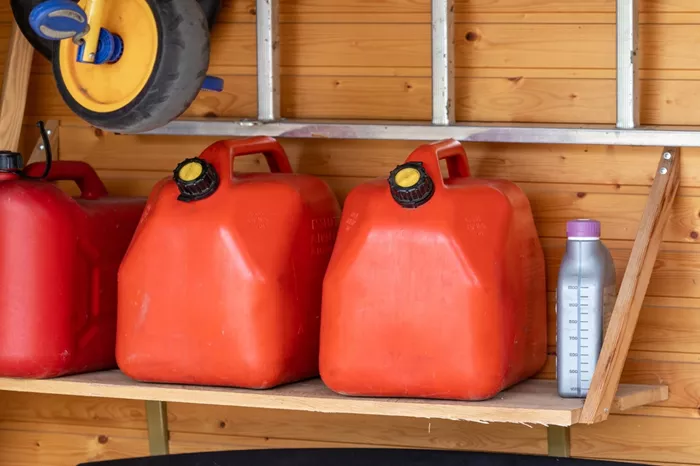Gasoline is a crucial resource for many households, whether for powering generators during emergencies or fueling lawn care equipment. However, storing gasoline safely is paramount to avoid risks such as fires, explosions, or environmental contamination. Understanding the best practices for gasoline storage can ensure safety and peace of mind. In this article, we explore five optimal places to store gasoline, each with its advantages and considerations.
1. Approved Gasoline Containers in a Well-Ventilated Area
The most basic and essential method of gasoline storage is in approved containers designed specifically for this purpose. These containers are typically made of metal or plastic and are equipped with safety features like pressure relief valves and flame arrestors. Storing gasoline in such containers ensures that it remains contained and minimizes the risk of spills or leaks.
When choosing a location for storing gasoline containers, prioritize well-ventilated areas away from living spaces and ignition sources. Garages with adequate ventilation or dedicated storage sheds are ideal choices. It’s crucial to avoid storing gasoline in basements or confined spaces where fumes can accumulate, potentially leading to health hazards or increased fire risk.
Ensure that the storage area is cool, dry, and out of direct sunlight to prevent deterioration of the gasoline over time. Regularly inspect containers for any signs of damage and replace them if necessary to maintain safety standards.
2. Underground or Above-Ground Fuel Storage Tanks
For those who require larger quantities of gasoline for extended periods, underground or above-ground fuel storage tanks offer a convenient and safe solution. These tanks are designed to meet specific safety standards and regulations, providing secure storage while minimizing environmental impact.
Underground tanks are particularly advantageous as they provide additional protection against temperature fluctuations and reduce the risk of vandalism or theft. They also help maintain gasoline quality over extended periods by shielding it from sunlight and reducing exposure to oxygen, which can cause degradation.
When installing fuel storage tanks, compliance with local regulations and safety codes is crucial. Tanks should be positioned on stable ground away from water sources and potential sources of ignition. Regular maintenance and inspection of tanks and associated equipment are necessary to ensure continued safety and compliance with environmental standards.
See also: What Was The Price Of Gasoline In 1960?
3. Professional Fuel Storage Facilities
For businesses or individuals with extensive gasoline storage needs, professional fuel storage facilities provide a secure and regulated option. These facilities are equipped with advanced safety features such as fire suppression systems, leak detection mechanisms, and environmental safeguards.
Using a professional fuel storage facility ensures compliance with all applicable safety and environmental regulations, minimizing legal liabilities and ensuring the safe storage of gasoline. These facilities often offer additional services such as fuel quality monitoring, delivery options, and emergency response capabilities, providing peace of mind to consumers and businesses alike.
When choosing a professional fuel storage facility, consider factors such as location, accessibility, and reputation. Ensure that the facility meets all regulatory requirements and has a proven track record of safety and reliability. Regularly review storage agreements and protocols to ensure continued compliance and optimal service.
4. Portable Gasoline Cans in a Vehicle
Portable gasoline cans are indispensable for emergencies or situations requiring mobility. Whether for refueling vehicles during a long trip or supplying equipment in remote locations, storing gasoline in portable cans offers flexibility and convenience.
When storing gasoline in portable cans within a vehicle, safety remains paramount. Choose cans specifically designed for transportation, with secure caps and spill-proof features. Store cans in a well-ventilated area of the vehicle, such as the trunk or a dedicated storage compartment, to minimize fume accumulation and potential risks.
Ensure that gasoline cans are positioned upright and secured to prevent tipping or movement during transit. Avoid storing gasoline in passenger areas of the vehicle, as this can increase the risk of exposure to fumes and pose a safety hazard in the event of an accident.
5. On-Site Fueling Stations
For businesses or facilities with frequent gasoline requirements, establishing an on-site fueling station can offer significant cost savings and operational efficiencies. On-site fueling stations provide immediate access to gasoline without the need for off-site refueling, reducing downtime and logistical challenges.
When designing an on-site fueling station, prioritize safety and compliance with regulatory standards. Install fuel storage tanks and dispensing equipment that meet industry-specific requirements and ensure proper containment measures are in place to prevent spills or leaks.
Implement strict safety protocols for fueling operations, including employee training, emergency response procedures, and regular equipment maintenance. Conduct routine inspections and audits to identify potential hazards and ensure compliance with environmental regulations.
Conclusion
Proper storage of gasoline is essential to prevent accidents, protect the environment, and comply with safety regulations. Whether using approved containers, underground tanks, professional facilities, portable cans, or on-site fueling stations, each method offers distinct advantages and considerations. By understanding the best practices for gasoline storage and implementing appropriate safety measures, individuals and businesses can safely manage their gasoline supply while minimizing risks and ensuring regulatory compliance.
Gasoline storage should always prioritize safety, environmental protection, and regulatory compliance. By following these guidelines and choosing the most suitable storage method for your needs, you can safely store gasoline and contribute to a safer environment for everyone.
Related topics:
Diesel Vs Gasoline: What Is The Difference?

